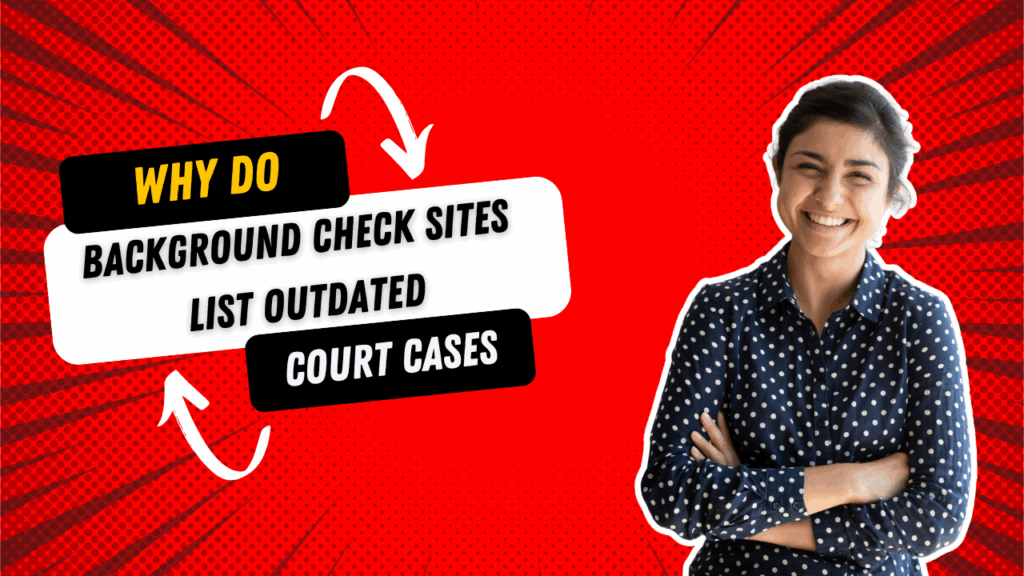You had a case years ago. It was dismissed, resolved, or even expunged. But when someone runs a background check, it still shows up. Why?
It’s frustrating. And it’s more common than most people think. Many background check sites are slow to update or just don’t bother. Let’s break down why outdated court cases keep showing up and what you can do about it.
Dig Deeper: How to Remove Court Records from Google Search
How Background Check Sites Get Your Info
1. They Pull From Public Sources
Most background check companies scan public court databases. These are open to anyone. That includes county, state, and federal records.
But here’s the problem. These sites often pull that data once, save it, and never check back. So if your case later gets expunged, sealed, or dismissed, the site might still show the old version.
2. They Use Data Brokers
Many background check sites buy info from data brokers. These are companies that collect and resell personal data. Once your case info is out there, it can bounce around the internet for years.
Some brokers update regularly. Others don’t. And there’s no rule forcing them to remove outdated info.
3. They Don’t Prioritize Accuracy
Accuracy doesn’t make money. Clicks do. These sites want traffic and ad revenue. Updating court records takes work. So unless you complain, they leave outdated stuff up.
A 2021 study by the National Consumer Law Center found that nearly 70% of background check complaints involved incorrect or outdated information.
Why Old Court Records Can Still Hurt You
Even if your record is no longer active, it can cause problems:
- Job applications get denied
- Rental applications are flagged
- Online reputation takes a hit
Most people won’t take the time to verify if your case was resolved. They see the headline and make a quick decision.
“I had a misdemeanor dismissed five years ago,” said Marcus, a 29-year-old in Florida. “But it kept showing up on background sites. I lost out on two job offers before I even got a chance to explain.”
Why the Info Doesn’t Go Away Automatically
1. Expungement Doesn’t Reach Everyone
When your record is expunged, it’s removed from court systems. But third-party sites don’t get that update unless someone notifies them.
Unless the law requires them to remove it, they don’t have to. This is where many people get stuck.
2. No One’s Monitoring Them
There’s no government body forcing background sites to stay current. The Fair Credit Reporting Act (FCRA) does require accuracy, but only for certain checks. Not all sites fall under that law.
Some sites even state in their terms that they make no guarantees about accuracy or freshness.
3. They Count on You Not Fighting Back
These sites don’t expect you to notice. Or complain. Or know how to make them update it. That’s how they keep outdated info online for so long.
What You Can Do About It
1. Search for Your Name
Start by Googling yourself. Look for your name, court case, or anything that looks like a public record. Write down the sites you find.
2. Opt Out From Background Sites
Many background check sites have opt-out forms. They usually ask for your name, the URL, and maybe an ID to confirm it’s really you.
Start with sites like:
- BeenVerified
- Spokeo
- TruthFinder
- Intelius
- PeopleFinders
Each site has its own process. Some take 48 hours. Others take longer. Some may republish you later, so keep track.
3. Send Removal Requests to Data Brokers
Go upstream. Contact the data brokers who may be feeding these sites. Use a reputation management service like Top Shelf Reputation if you don’t have time to do it all manually.
They can:
- Monitor your name online
- Send removal requests
- Keep old data from coming back
4. Suppress the Results in Search
If you can’t get the site to remove the record, push it down in search. That means:
- Creating a personal website with your name
- Setting up social media profiles (even basic ones)
- Publishing blogs, press releases, or articles that show your best side
Google ranks fresh, active content higher. That helps bury the old stuff.
5. File an FCRA Complaint (If Eligible)
If a background check cost you a job or apartment, and the site was used for that, they may be subject to FCRA rules. You can:
- File a dispute with the company
- Contact the Consumer Financial Protection Bureau (CFPB)
- Consider legal help
Final Thoughts
Outdated court records are a common and frustrating issue. These sites make it hard to move on, even when your legal history is behind you.
But you’re not stuck. You can push back, opt out, and clean up your presence. It takes time, but it’s worth it.
Don’t wait until you lose a job or housing to act. Run a search on yourself, see what’s out there, and start removing or suppressing what you can.
Background check sites rely on people not fighting back. So fight back.
Need help? Top Shelf Reputation specializes in managing court records online, even when they can’t be fully removed. Contact us today to take back control of your online image.

